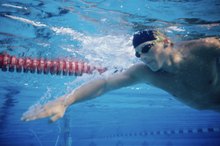Hyperventilation And Swimming
Hyperventilation while swimming can be intentional or accidental, but both types of incidents can kill, even in shallow water. Caused by breathing rapidly or taking too many deep breaths in succession, hyperventilation fundamentally alters your blood chemistry and the way your body sends warning signals to your brain. Rather than enriching yourself with oxygen, hyperventilation can lead to dangerously low levels of oxygen.
Basics
Beginning swimmers might be nervous about breathing during swimming, as it can be daunting to swim facing down in the water and to regulate breathing during the stroke. You might react by breathing fast, and inadvertently reducing levels of carbon dioxide in your bloodstream. Anxiety mixed with inexpert technique causes swimmers to overexert themselves during the stroke and quickly use up oxygen supplies. Elite swimmers sometimes deliberately hyperventilate in competitive workouts whether swimming underwater or mindfully limiting breathing during lap swimming. Either way, you use up oxygen but might be unaware of the dire situation.
- Beginning swimmers might be nervous about breathing during swimming, as it can be daunting to swim facing down in the water and to regulate breathing during the stroke.
- Anxiety mixed with inexpert technique causes swimmers to overexert themselves during the stroke and quickly use up oxygen supplies.
Mechanism
Swimming With a Cough
Learn More
Sensors in your aorta and carotid arteries alert your brain when carbon dioxide levels rise, and trigger you to take a breath. Hyperventilating sends your cardiovascular system out of balance, diluting carbon dioxide concentration. Diminished concentration levels of carbon dioxide lull your brain into the false security. You run out of oxygen without ever feeling the urge to replenish the supply.
- Sensors in your aorta and carotid arteries alert your brain when carbon dioxide levels rise, and trigger you to take a breath.
- Hyperventilating sends your cardiovascular system out of balance, diluting carbon dioxide concentration.
Dangers
Holding your breath underwater after you hyperventilate can lead to shallow-water blackout, a condition in which you become disoriented and then lose consciousness. Once unconscious, you reflexively gasp for air, taking in water and potentially drowning. Hyperventilation and resulting low air, or hypoxia alters your blood's pH levels, and levels falling below 7.2 can cause fatal heart arrhythmias and death according to Dr. Tom Griffiths and Dr. Walter Griffiths in an online article for Aquatic Safety Research Group.
- Holding your breath underwater after you hyperventilate can lead to shallow-water blackout, a condition in which you become disoriented and then lose consciousness.
Prevention
How Is Breathing Regulated?
Learn More
You can prevent accidental hyperventilation by learning to relax in the water. Practice drills can teach you how to regulate your breathing while swimming. The more you practice, the less anxious you will feel, and the easier you will breathe 1. Never engage in competitive breath-holding or extensive "no-breather" underwater training, regardless of challenges from teammates or even coaches. The American Red Cross and the YMCA work to raise public awareness about the dangers of hyperventilation while swimming.
- You can prevent accidental hyperventilation by learning to relax in the water.
Related Articles
References
- Merck Manuals; Control of Breathing; August 2006
- Schwartzstein RM, Richards J, Edlow JA, Roy-Byrne PP. Hyperventilation syndrome. UpToDate. Updated December 10, 2019.
- Gerez M, Sada A. Tello A. Amygdalar hyperactivity, a fear-related link between panic disorder and mesiotemporal epilepsy. Clin EEG Neurosci. 2011;42(1):29-39. doi:10.1177/155005941104200108
- Lechtzin N. Hyperventilation syndrome. Merck Manual Professional Version. Updated April 2018.
- American Heart Association. About heart attacks. Updated July 31, 2016.
- Whited L, Graham DD. Abnormal respirations. StatPearls. Updated July 30, 2019.
- MedlinePlus. Hyperventilation. Updated June 28, 2018.
- West JB. High-altitude medicine. Am J Respir Crit Care Med. 2012;186(12):1229-1237. doi:10.1164/rccm.201207-1323CI:1229-37
- Jones M, Harvey A, Marston L, O'connell NE. Breathing exercises for dysfunctional breathing/hyperventilation syndrome in adults. Cochrane Database Syst Rev. 2013;(5):CD009041. doi:10.1002/14651858.CD009041.pub2
Writer Bio
Barrett Barlowe is an award-winning writer and artist specializing in fitness, health, real estate, fine arts, and home and gardening. She is a former professional cook as well as a digital and traditional artist with many major film credits. Barlowe holds a Bachelor of Arts in English and French and a Master of Fine Arts in film animation.









